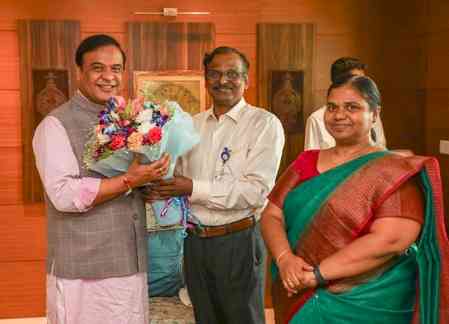A technical glitch, banking loopholes allow cyber fraudsters to thrive in Bihar
In a joint operation by the Telangana and Nawada police of Bihar on August 13, four fraudsters including the kingpin Mithilesh Prasad, were arrested after a brief encounter.

Patna, Aug 27 (IANS) In a joint operation by the Telangana and Nawada police of Bihar on August 13, four fraudsters including the kingpin Mithilesh Prasad, were arrested after a brief encounter.
When interrogated, the joint team was shocked to hear their confessions.
Gaurav Mangla, the SP of Nawada said: "The accused confessed that they duped a number of people of crores of rupees. The police team recovered Rs 1.23 crore from the house of the kingpin apart from two vehicles."
"When the joint team raided the village of the kingpin, Bhawani Bigha, four persons including Prasad were seated in a car. They fired at the police team and tried to flee. The police fired at them and arrested them after a brief chase," he said.
On August 17, a joint team of the Bihar and Rajasthan police arrested a person named Jitendra Ram from his native village Apsandh for his alleged involvement in cyber fraud. The joint team recovered several incriminating documents, mobile phones and SIM cards from his possession.
On February 15, a joint team of SWAT and Nawada police arrested 33 persons from Thalaposh village. The team recovered three laptops, over 3 dozen mobile phones and a bike from their possession.
These are some of the incidents which prove that cyber fraudsters are active in the region.
The naxal dominated Nawada is located on the border of Jharkhand's Koderma district. Due to it being a border district, there are several places having dual junctions where mobile towers frequently fluctuate. They sometimes catch the mobile towers of Nawada and sometimes from Koderma.
"The cyber fraudsters use this technical glitch to hide their identities and actual locations. A cyber conman belonging to Nawada can use the mobile towers of Koderma to confuse investigators," an official of the Economic Offences Wing said.
The fraudsters generally have a rural background but they are skilled and trained to fool the people of the metros. They generally victimise city people and many of the victims lost small amounts. They may file online complaints in cyber cells but the police of the respective states hardly act in all the cases. They generally take action in cases where big amounts are involved.
During the investigation in some of the cases, it appeared that the accused used to open bank accounts in the name of labourers and poor people who did not know about the fraud.
The accused are managing to open fake accounts in large numbers.
"On one occasion, when we reached the house of a person in Nawada, we were shocked to know that an illiterate labourer had a bank account used in the transaction of money.
"When we charged that he withdrew lakhs of rupees from his bank account, he revealed that some persons who claimed to be bank officials approached him and took his Aadhar card, ration card, BPL card, and thumb impression on a plain paper to open an account.
"Later, he received a bank passbook. During verification, we found that all the information was correct but the bank name and account number were different," the official said.
"The accused had used the documents to open accounts at other banks after little changes in the address. The banks and mobile wallet companies never go for physical checking of individuals at the time of opening the account and mobile wallets," the official said.
The police investigation revealed that the thumb impression was taken on a plain paper and scanned digitally. They used photoshop to clean up the image and a polymer chemical stamp machine to make a rubber thumb.
"Under the banking procedures a decade ago, opening a savings account required two guarantors. Now, bank representatives are reaching your doorstep, taking necessary documents, signatures and thumb impressions to open bank accounts. Such a practice became widespread after the introduction of Jan-Dhan accounts. There are huge loopholes in it as those papers can be used to open other accounts. Moreover, no one checks the authenticity of persons who claim to be the representatives of various banks."
The network of cyber fraudsters is spread in states such as Bihar, Jharkhand, Odisha, West Bengal, and the northeastern states. They generally target the poor and illiterate people by luring them to open Jan Dhan accounts to get government benefits and thus obtain their documents and thumb impressions.
"It is called fraud after fraud where conmen siphoned off the hard earned money of common people mostly living in urban areas and transferred it within a few minutes to multiple bank accounts in the rural areas, taking advantage of liberalisation in the banking sector," the officer said.
"The dark side of liberalisation in the banking and financial sectors has allowed the mushrooming of over 100 mobile wallet companies in the country and conmen frequently use it to dispose off the conned money. Shockingly, there is hardly any method to zero in on the accused. The success rate of cracking such cases is not more than 15%. The accused in some of the cases fall into the police net but it is very difficult to recover the money from them," he said.
Patna based cyber expert Rakesh Sharma said: "Selling bank accounts in districts like Jamtara and Dumka in Jharkhand, Nawada, Sheikhpura in Bihar is a common practice. The gangs operating from these districts of Bihar are different from the notorious Jamtara gang but they operate on almost the same lines."
"They mainly track online market platforms like OLX and present themselves as sellers of products and use it to cheat buyers during online transactions. Besides, they also send links to web domains from bulk messages to several persons for details like debit or credit card number, CVV number, date of expiry, MPIN, Mail ID and Password," Sharma said.


 IANS
IANS 








